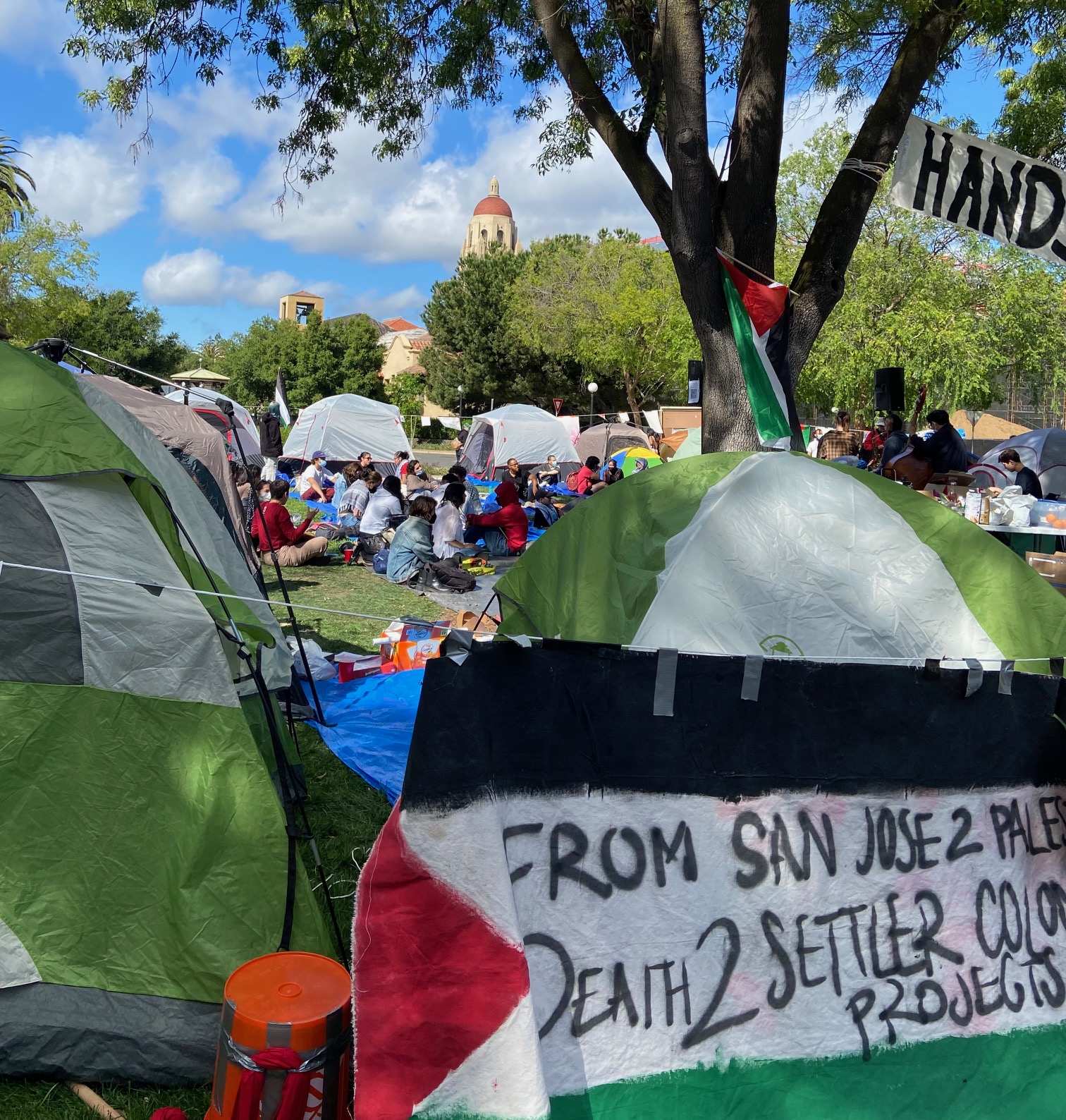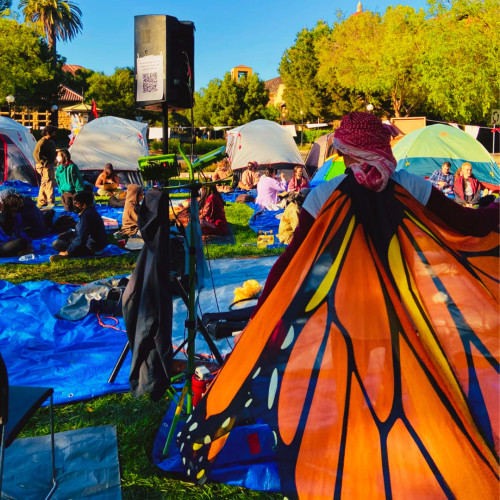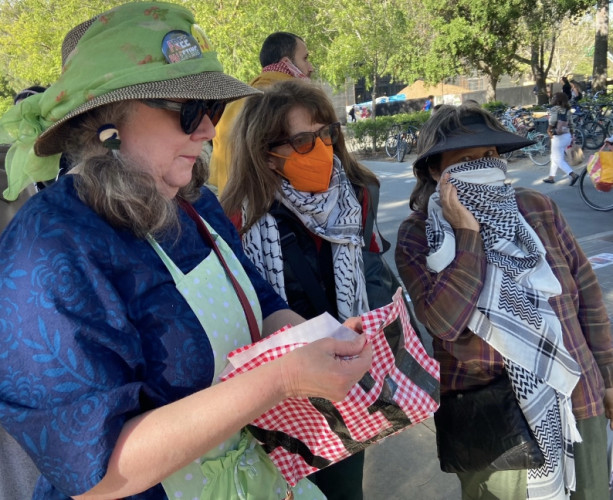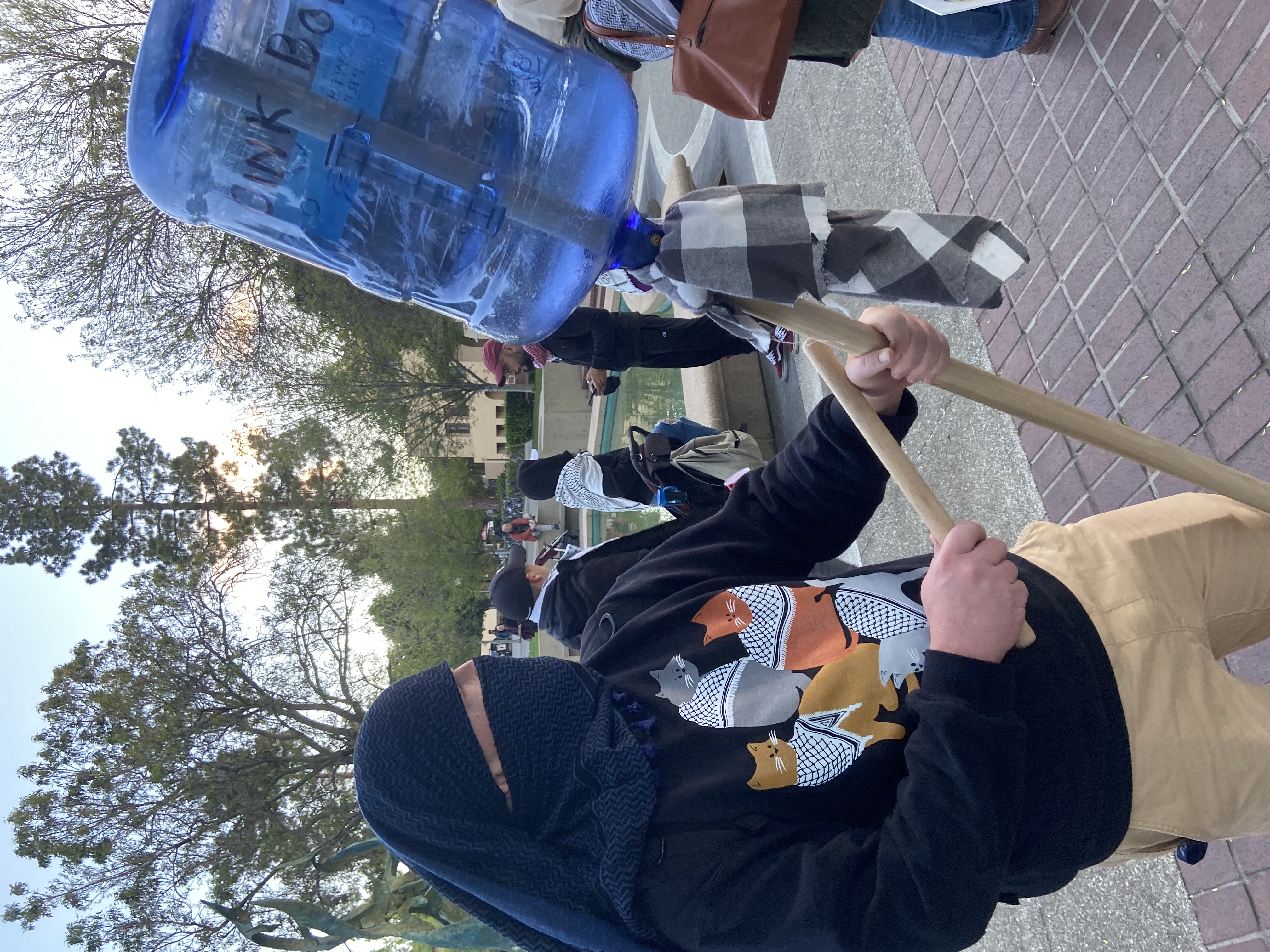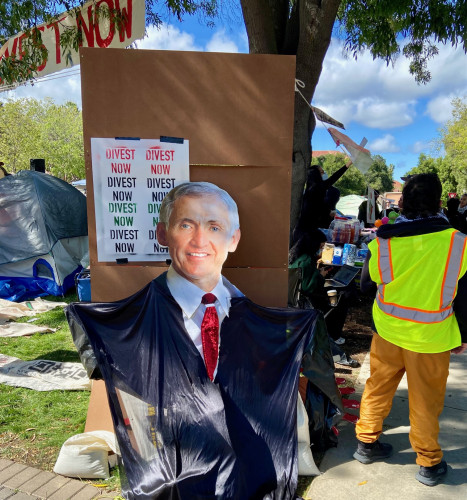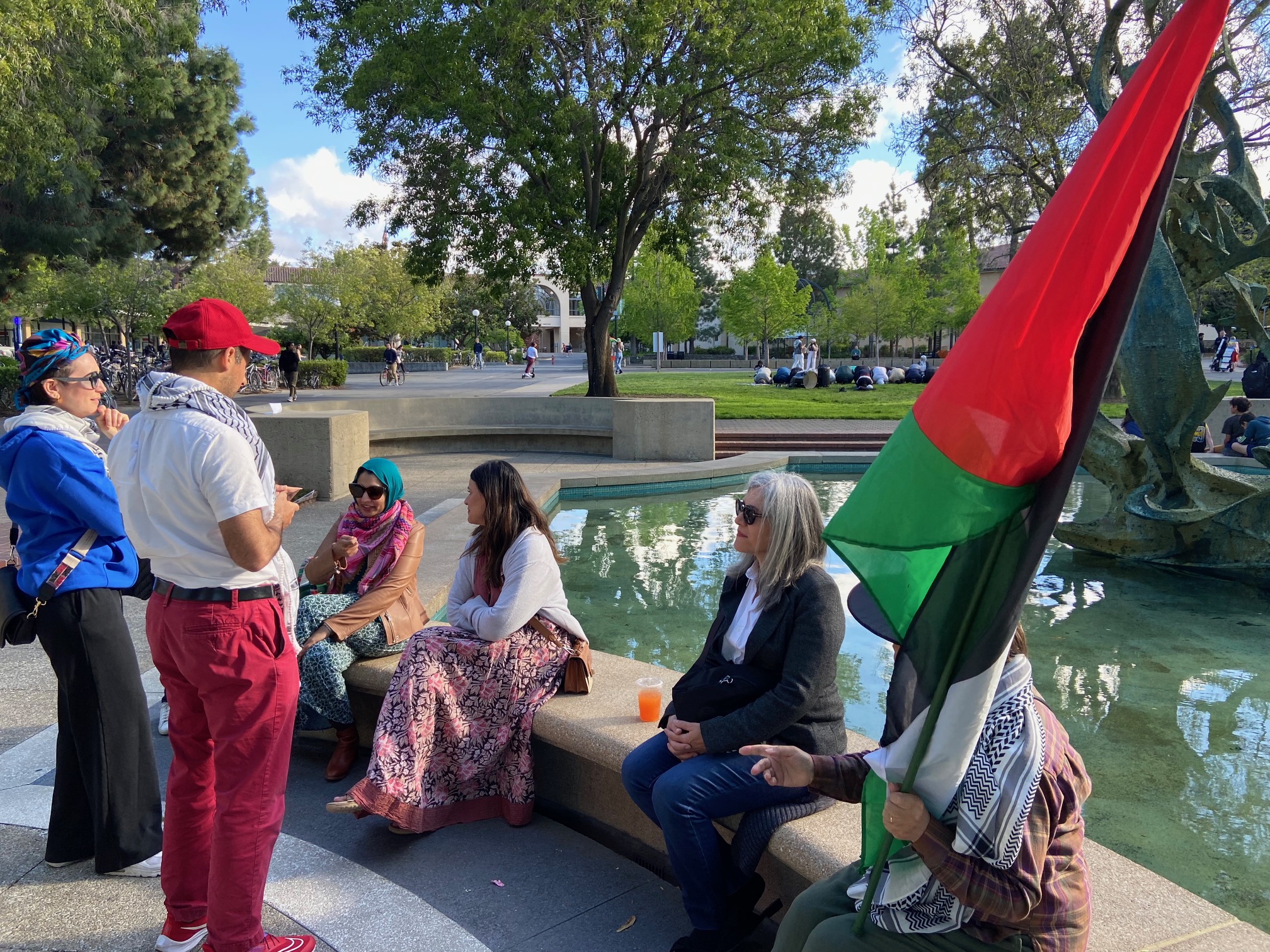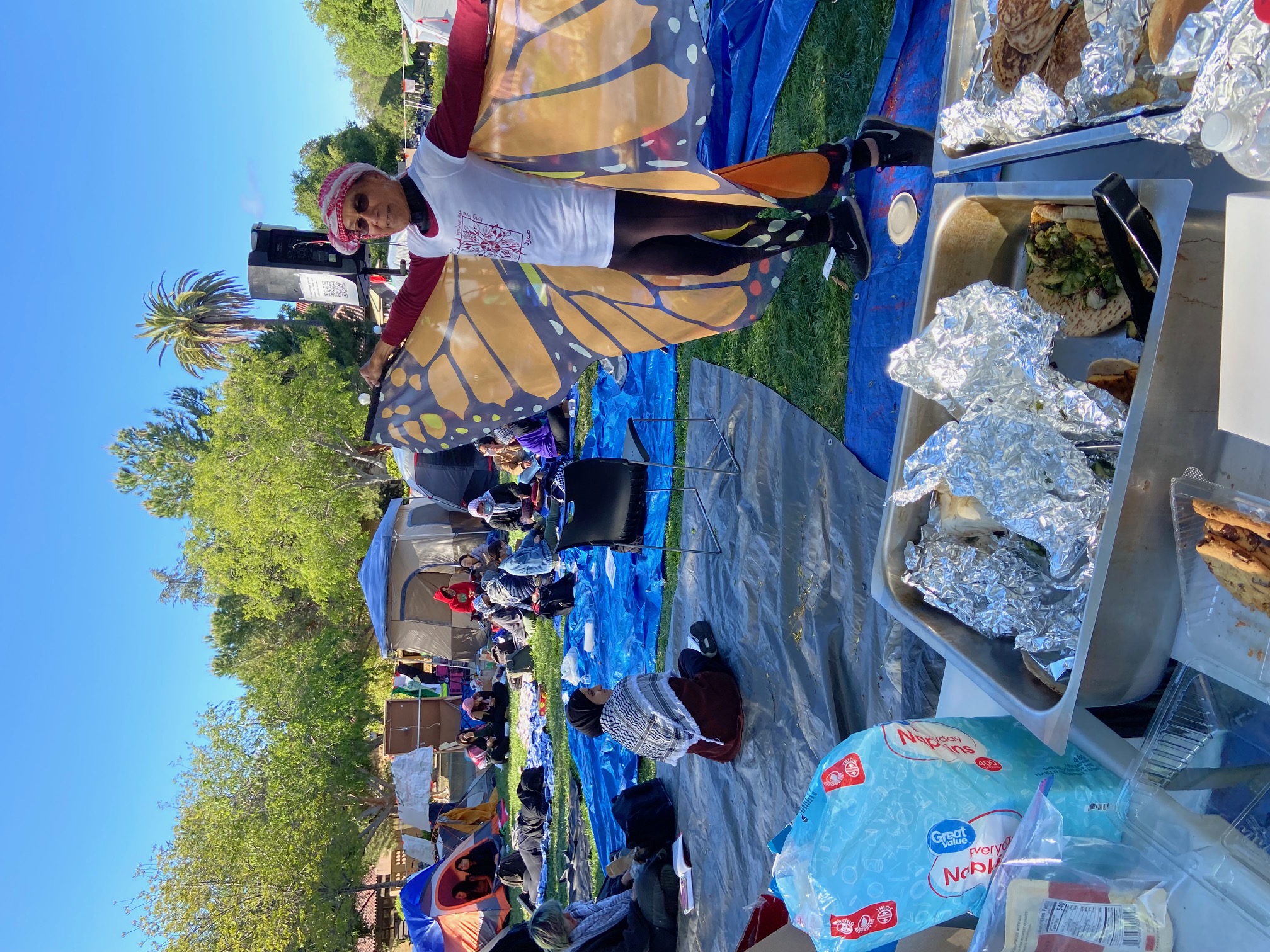From the Open-Publishing Calendar
From the Open-Publishing Newswire
Indybay Feature
Stanford U. Encampment in Second Day
Stanford administration is using police to intimidate students into leaving pro-Palestine encampment. Students are being supported by community and alumni.
On Day 2 of the Stanford encampment for Palestine, students held a People’s Tribunal charging the University with active complicity in the Israeli genocide of Palestinians through its investments in Israel and repression of student voices. The people found Stanford guilty.
Students are getting support from community members including Vigil for the Children of Gaza, a group that protests in Palo Alto every Sunday. @vigil4gaza sent many regular participants to the encampment on days 1 and 2. The Raging Grannies distributed masks, later leading chants and a singalong. Dance of Peace descended on the tent encampment with a beautiful butterfly dance, raising spirits.
Students are getting support from community members including Vigil for the Children of Gaza, a group that protests in Palo Alto every Sunday. @vigil4gaza sent many regular participants to the encampment on days 1 and 2. The Raging Grannies distributed masks, later leading chants and a singalong. Dance of Peace descended on the tent encampment with a beautiful butterfly dance, raising spirits.
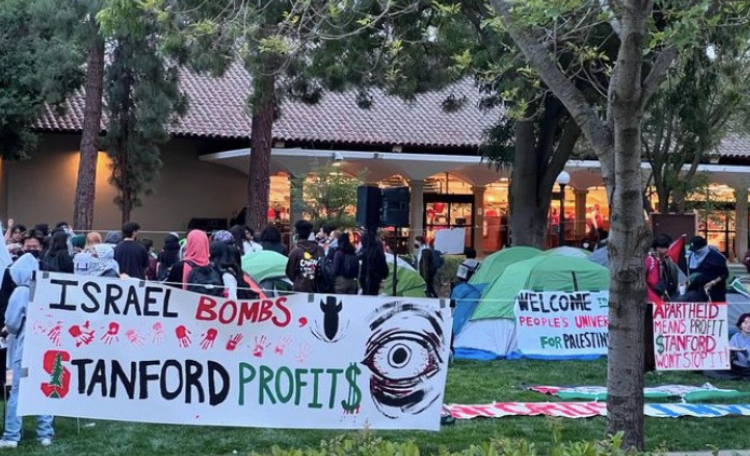
Add Your Comments
Comments
(Hide Comments)
The mission is not complete as long as the genocidal university remains private property...
https://www.clereviewofbooks.com/writing/interview-malcolm-harris-interview
'RB: Let's talk about your last chapter, titled “Resolution.” It seems like the internal plight of today's left is a question of principle versus pragmatism. In this final chapter, you take a fairly principled position, lobbying for reparations to Native Americans via the Land Back Movement. You specifically state that Stanford should return its 8,000+ acres and grant its ~$37 billion endowment to the Muwekma Ohlone. This is a principled position, obviously, but you argue that it's actually pragmatic. Stanford's board doesn't seem terribly interested in forward thinking and morally utilitarian projects when it's their limb on the chopping block. So what kind of leverage could you imagine inspiring such as sea change from the capitalist class, to even entertain something like you've proposed?
MH: You say it's a sea change, but in terms of the scale of what we're talking about, it's tiny. 8,000 acres in the context of North America is nothing, absolutely nothing.
RB: In the context of state or federally owned land, for sure. But for privately owned, coastal California real estate in the Bay Area, that much acreage is...
MH: Sure, that counts for a lot. But again, if you're only going to give away the parks where no one lives and say “you can watch the park for us, but we're not going to let you build houses,” then fuck you.
So on one level, I think it's so small, and it's so easy and pragmatic. You don't even have to convince the government. This is a board of trustees for a university. They make all sorts of crazy lefty decisions all the time, right? That's what we're told. They're not accountable to anyone, except maybe the founders, and they can choose to reject that.
At the same time there are precedents. I outline how [Stanford's Board of Trustees] violated that covenant with the founders [forbidding the sale or parceling of the university's land] once before, for the land that they ceded to the federal government to build the VA. That's a sovereign entity. So they made an exception for a sovereign entity. They recognize the Muwekma Ohlone and repatriated remains. Even though the Federal Government has not recognized—and refuses to recognize—the Muwekma, Stanford has gone ahead and recognized them anyway. They've got a land acknowledgment that acknowledges the Muwekma as the rightful owners of the land, and there's a tribal organization that they can transfer the land to.
So if we're looking at possibilities for the return of land to indigenous groups in the North American continent, this seems like super low-hanging fruit. It wouldn't cost anybody any money. Nobody owns this land, personally, no one settler. It's a nonprofit that can choose to give it away, to give it back.
The first 600 pages of the book, we're talking about world historical scale problems, and then we turn to ten people and say, "alright, here's how we can start solving this. You guys can take this act. You don't have to confiscate anybody's oil wells, you don't have to show up with guns anywhere. You just gotta sign a piece of paper and cede some of this land that you're not even using." Because it's not like Stanford uses all their thousands of fucking acres.
This would be a major historical step forward for this country and the world, going into the next century. Bigger than any climate school they're going to do. Bigger than any school initiative that they're doing with those billions of dollars. They could accomplish what they say their goals are very easily, with very little work.'
https://www.clereviewofbooks.com/writing/interview-malcolm-harris-interview
'RB: Let's talk about your last chapter, titled “Resolution.” It seems like the internal plight of today's left is a question of principle versus pragmatism. In this final chapter, you take a fairly principled position, lobbying for reparations to Native Americans via the Land Back Movement. You specifically state that Stanford should return its 8,000+ acres and grant its ~$37 billion endowment to the Muwekma Ohlone. This is a principled position, obviously, but you argue that it's actually pragmatic. Stanford's board doesn't seem terribly interested in forward thinking and morally utilitarian projects when it's their limb on the chopping block. So what kind of leverage could you imagine inspiring such as sea change from the capitalist class, to even entertain something like you've proposed?
MH: You say it's a sea change, but in terms of the scale of what we're talking about, it's tiny. 8,000 acres in the context of North America is nothing, absolutely nothing.
RB: In the context of state or federally owned land, for sure. But for privately owned, coastal California real estate in the Bay Area, that much acreage is...
MH: Sure, that counts for a lot. But again, if you're only going to give away the parks where no one lives and say “you can watch the park for us, but we're not going to let you build houses,” then fuck you.
So on one level, I think it's so small, and it's so easy and pragmatic. You don't even have to convince the government. This is a board of trustees for a university. They make all sorts of crazy lefty decisions all the time, right? That's what we're told. They're not accountable to anyone, except maybe the founders, and they can choose to reject that.
At the same time there are precedents. I outline how [Stanford's Board of Trustees] violated that covenant with the founders [forbidding the sale or parceling of the university's land] once before, for the land that they ceded to the federal government to build the VA. That's a sovereign entity. So they made an exception for a sovereign entity. They recognize the Muwekma Ohlone and repatriated remains. Even though the Federal Government has not recognized—and refuses to recognize—the Muwekma, Stanford has gone ahead and recognized them anyway. They've got a land acknowledgment that acknowledges the Muwekma as the rightful owners of the land, and there's a tribal organization that they can transfer the land to.
So if we're looking at possibilities for the return of land to indigenous groups in the North American continent, this seems like super low-hanging fruit. It wouldn't cost anybody any money. Nobody owns this land, personally, no one settler. It's a nonprofit that can choose to give it away, to give it back.
The first 600 pages of the book, we're talking about world historical scale problems, and then we turn to ten people and say, "alright, here's how we can start solving this. You guys can take this act. You don't have to confiscate anybody's oil wells, you don't have to show up with guns anywhere. You just gotta sign a piece of paper and cede some of this land that you're not even using." Because it's not like Stanford uses all their thousands of fucking acres.
This would be a major historical step forward for this country and the world, going into the next century. Bigger than any climate school they're going to do. Bigger than any school initiative that they're doing with those billions of dollars. They could accomplish what they say their goals are very easily, with very little work.'
We are 100% volunteer and depend on your participation to sustain our efforts!
Get Involved
If you'd like to help with maintaining or developing the website, contact us.
Publish
Publish your stories and upcoming events on Indybay.
Topics
More
Search Indybay's Archives
Advanced Search
►
▼
IMC Network


